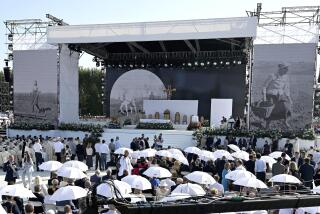Jews Thank the French Town That Saved Them
- Share via
CHAMBON-SUR-LIGNON, France — The people of this hardscrabble hill town in the French Massif Central Range never thought of themselves as heroes.
They didn’t think twice when several thousand terrified Jews came here seeking shelter during World War II and Nazi Germany’s occupation of France. The townspeople were mostly Protestant Christians whose ancestors suffered centuries of persecution in Roman Catholic France. When the Jews asked for refuge, Chambon-sur-Lignon gave it.
By the end of the war, the little Huguenot farming village in the Haute Loire region of France had protected 5,000 Jews--one for every man, woman and child in the town.
On Sunday, the aging population of this remarkable town was acclaimed for those acts of courage and integrity 50 years ago.
In an emotional afternoon, they saw for the first time an American documentary film, “Weapons of the Spirit,” by Los Angeles filmmaker Pierre Sauvage, dedicated to the town. And the Israeli ambassador to France, Ovadia Sofer, awarded them Yad Vashem medals of “righteousness” for their courage.
On hand for the ceremonies were several dozen of the wartime Jewish refugees and the handful of people who saved them who are still living.
The survivors found themselves overcome by affection mixed with a feeling that they had never properly acknowledged the people of the town.
“We had no idea of the terrible things that were going on outside Chambon,” remembered one of the survivors, Jack Lewin of Woodmere, N.Y. “These people protected us from the horror. I will never forget what they did.”
Lewin, 65, is an American Jew who was born in Germany and found refuge in the town for two years before escaping to Switzerland. The ceremonies Sunday marked the second time in four years that the retired chef has traveled here to personally thank the people of Chambon.
Half a century ago, when German soldiers and French collaborators came to Chambon-sur-Lignon hunting Jews, the townspeople refused to cooperate. Several villagers, including Daniel Trocme, nephew of the town pastor, paid the price of their silence by being sent off to Nazi death camps.
“My brother only did what he considered his duty,” said Robert Trocme of his sibling, who was exterminated in the Nazi death camp at Maidanek, Poland, in 1944 for sheltering Jewish children. “He was willing to give his life to help reconstruct the future.”
The bravery of the people of Chambon and of the peasants in the surrounding countryside stood in stark contrast to the dismal record in much of the rest of France, where more than 75,000 Jews were rounded up and sent to Germany for extermination, often with the cooperation of the French people.
At Sunday’s ceremony, the townspeople found themselves a little embarrassed and wondering what it was all about. The town’s young Protestant pastor, for one, is concerned that all the attention will cause the town to lose the humility and spirit of righteousness that led to its courageous wartime acts.
“I think these ceremonies are very dangerous,” he said, standing outside the small stone Protestant reform church with the words “Love One Another” painted over the door. “We risk breaking the spirit of what we did here. I am afraid we will become too proud of ourselves and lose our ability to react to what happens in the world.”
Later in the day, the pipe-smoking pastor used the occasion of the medal awards ceremony to criticize the killing of Palestinian protesters by Israeli police, demonstrating the tradition of religious leaders in the town to speak out loudly and boldly, no matter who is listening. One of his predecessors in the pulpit, pacifist Pastor Andre Trocme, had been credited with leading the Chambon-area effort to resist the Germans and protect Jews. Trocme, uncle of death camp victim Daniel, was the main character in the 1979 book “Lest Innocent Blood be Shed,” by American philosopher and historian Phillip Hallie. The book was the first to celebrate the courage of the region.
Probably the most satisfied with the events here Sunday was independent filmmaker Sauvage, who spent seven years interviewing townspeople to make the film.
Sauvage, 46, was born in Chambon-sur-Lignon in 1944. If it had not been for the townspeople who hid his parents, he might not be alive. The doctor who delivered him, Roger Forestier, was arrested and killed by the Nazis.
More to Read
Sign up for Essential California
The most important California stories and recommendations in your inbox every morning.
You may occasionally receive promotional content from the Los Angeles Times.










